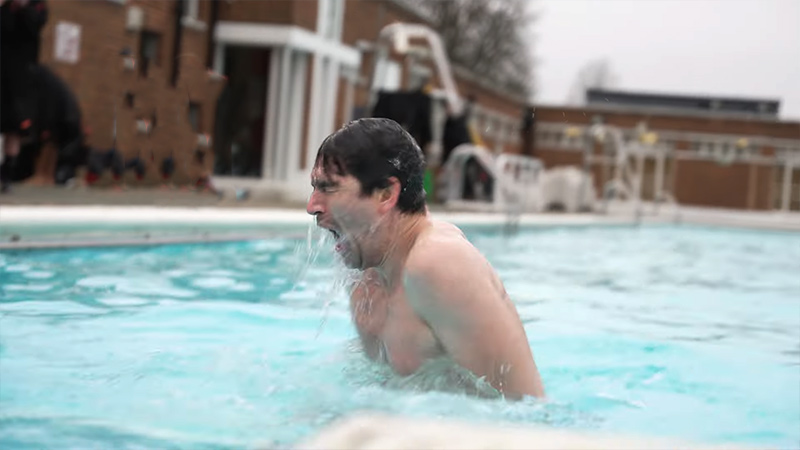High blood pressure, or hypertension, is a widespread health concern that affects millions of people worldwide.
While medications and lifestyle modifications are commonly prescribed for their management, the allure of natural remedies and alternative therapies persists. One such unconventional method is cold water swimming.
Cold water swimming, often celebrated for its exhilarating and invigorating effects, has gained popularity as a potential remedy for various health issues.
However, the question remains: can a plunge into icy waters really help regulate high blood pressure?
In this blog post, we will explore the science behind cold water swimming and its potential impact on blood pressure. We’ll discuss the short-term effects, potential long-term benefits, and important considerations for those with hypertension.
By the end, you’ll have a clearer understanding of whether cold water swimming is a viable approach for managing high blood pressure.
Is Cold Water Swimming Good for High Blood Pressure?
Cold water swimming, also known as cold water immersion or winter swimming, is a popular activity in which individuals swim in cold water, typically in temperatures below 15°C (59°F).
While there is some evidence to suggest that cold water swimming may offer certain health benefits, it’s essential to approach it with caution, especially if you have high blood pressure or any underlying medical conditions.
Here are some potential considerations:
Benefits for blood pressure
Cold water swimming may have a short-term effect on reducing blood pressure because cold water causes blood vessels to constrict, which can temporarily raise blood pressure.
However, once you adapt to the cold water, your body may start to regulate blood pressure more effectively.
Regular cold water exposure, such as cold water swimming, may help improve your cardiovascular health over time, which can indirectly benefit blood pressure regulation.
Risks and considerations
If you have high blood pressure or other cardiovascular issues, it’s crucial to consult with your healthcare provider before engaging in cold water swimming.
Cold water immersion can be stressful on the cardiovascular system, potentially leading to increased heart rate and blood pressure. This can be dangerous for individuals with certain heart conditions or uncontrolled hypertension.
Hypothermia is a risk in very cold water, which can strain the body and potentially lead to cardiac issues.
The shock of cold water immersion may also trigger a “cold shock response,” which can be particularly dangerous for people with heart problems or high blood pressure.
The Basics of High Blood Pressure
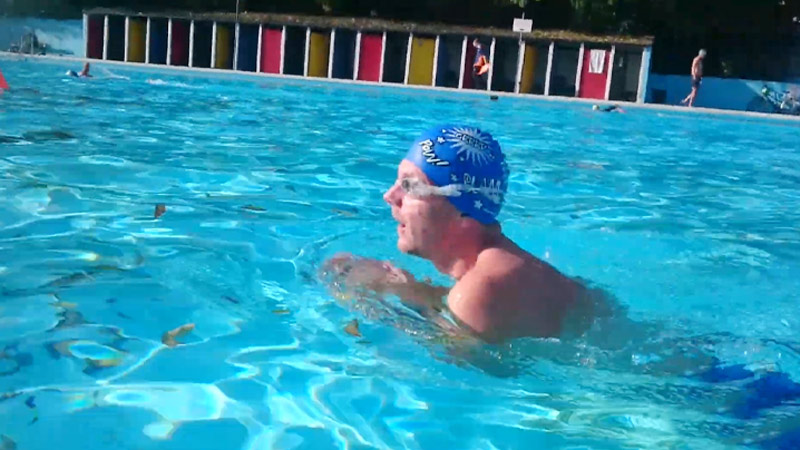
Cold plunge high blood pressure, also known as hypertension, is a common medical condition in which the force of blood against the walls of your arteries is consistently too high.
This condition can lead to various health problems if left untreated. Here are the basics of high blood pressure:
Blood Pressure Measurement
Cold plunge and high blood pressure is typically measured in millimeters of mercury (mm Hg) and are expressed as two values: systolic and diastolic.
Systolic pressure (the higher number) represents the force of blood against artery walls when the heart beats and pumps blood.
Diastolic pressure (the lower number) represents the force of blood when the heart is at rest between beats.
Normal Blood Pressure
A normal blood pressure reading is generally considered to be around 120/80 mm Hg.
Hypertension is often defined as having a blood pressure consistently at or above 130/80 mm Hg.
Types of Hypertension
This is the most common type of hypertension, and its exact cause is often unknown. It tends to develop over time due to a combination of genetic, lifestyle, and environmental factors.
This type of hypertension is caused by an underlying medical condition, such as kidney disease, hormonal disorders, or medication side effects.
Risk Factors
Several factors can contribute to the development of high blood pressure, including genetics, age, obesity, lack of physical activity, poor diet, excessive alcohol consumption, and chronic stress.
Complications of High Blood Pressure
If left untreated, high blood pressure can lead to serious health complications, including heart disease, stroke, kidney damage, and other cardiovascular problems.
It is often called the “silent killer” because it can develop without noticeable symptoms. Regular blood pressure monitoring is crucial for early detection and management.
Diagnosis
Blood pressure is typically measured with a sphygmomanometer, which consists of an inflatable cuff and a pressure gauge.
Diagnosis of high blood pressure usually involves multiple blood pressure readings taken on different occasions. A diagnosis is made if consistently elevated readings are observed.
Treatment and Management
Lifestyle changes can often help manage blood pressure, including a healthy diet, regular exercise, weight management, reduced salt intake, and stress reduction.
In some cases, healthcare providers may prescribe antihypertensive medications to help lower blood pressure. These may include diuretics, ACE inhibitors, beta-blockers, and others.
Regular Monitoring
It is essential for individuals with high blood pressure to monitor their blood pressure regularly and follow their healthcare provider’s recommendations for managing their condition.
Managing high blood pressure is crucial for reducing the risk of associated health problems.
If you are concerned about your blood pressure or have risk factors for hypertension, it’s important to consult with a healthcare professional for proper evaluation and guidance on how to maintain a healthy blood pressure level.
The Benefits of Cold Water Swimming
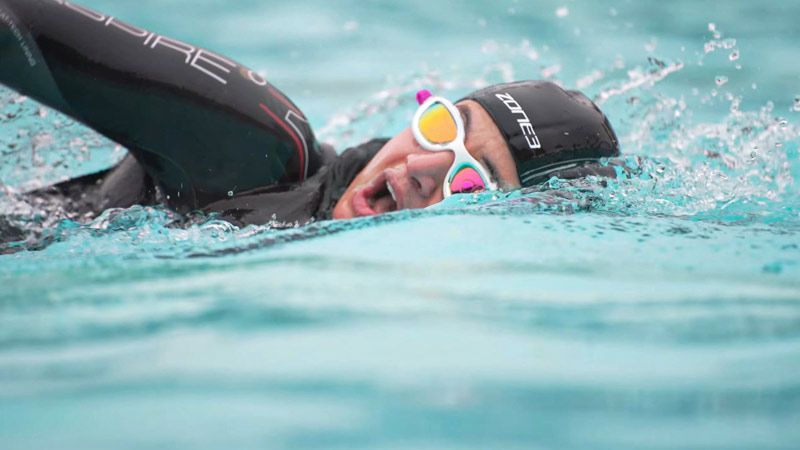
Cold water swimming, or cold water immersion, has gained popularity as an outdoor activity and is often touted for its potential health benefits.
While research in this area is ongoing and the effects can vary from person to person, here are some potential benefits associated with cold water swimming:
- Improved Circulation: Cold water immersion can cause blood vessels to constrict (vasoconstriction) to conserve heat. When you warm up after swimming, they dilate (vasodilation). This can promote circulation and may improve overall cardiovascular health.
- Mood Enhancement: Cold water swimming can release endorphins, which are natural mood lifters. Many people find the experience exhilarating and report feeling happier and less stressed after a cold water swim.
- Immune System Boost: Some proponents suggest that regular exposure to cold water can stimulate the immune system. However, more research is needed to confirm this effect.
- Pain Relief: Cold water can temporarily numb pain and reduce inflammation. Some people find cold water swimming helpful for managing conditions like arthritis or muscle soreness.
- Increased Metabolism: Your body works harder to maintain its core temperature in cold water. This can lead to increased calorie expenditure and potentially help with weight management.
- Stress Reduction: The cold water experience may act as a natural stressor, helping individuals adapt to stressful situations and become more resilient over time.
- Better Skin and Hair: Cold water can tighten pores, which may improve skin health. It can also make hair shinier and reduce oil production.
- Improved Sleep: Some people report better sleep after cold water swims. The experience may help you relax and unwind, leading to improved sleep quality.
- Increased Alertness: The shock of cold water can make you feel more awake and alert, which may improve cognitive function temporarily.
- Social and Community Benefits: Cold water swimming is often done in groups or communities, providing social and psychological support, as well as a sense of belonging.
It’s important to note that while cold water swimming has potential benefits, it’s not suitable for everyone.
There are risks involved, including hypothermia and cold shock response. People with certain medical conditions, like heart problems, should consult with a healthcare professional before attempting cold water swimming.
Additionally, it’s crucial to start slowly, acclimatize to the cold gradually, and be aware of your body’s limits.
Cold Water Swimming for Blood Pressure
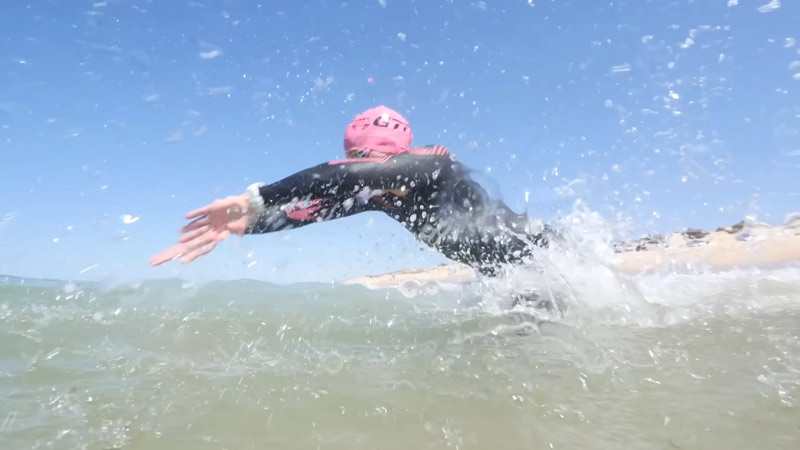
Cold water swimming is not a recommended or proven treatment for high blood pressure (hypertension).
While there are some potential cardiovascular benefits associated with cold water swimming, including improved circulation and increased cardiovascular fitness, it should not be considered a primary or sole method for managing high blood pressure.
Here’s why:
Temporary Effects
Cold water immersion can cause a short-term increase in blood pressure as the body constricts blood vessels to conserve heat.
After the swim, blood pressure may temporarily decrease, but these effects are generally short-lived.
Individual Variability
The response to cold water varies from person to person, and individuals with high blood pressure may experience different reactions. Some people might find it uncomfortable, stressful, or even dangerous.
Risk of Cold Shock Response
Sudden immersion in cold water can trigger a cold shock response, which can include rapid breathing, increased heart rate, and a potential rise in blood pressure.
For individuals with hypertension or heart problems, this response can be risky.
Hypothermia Risk
Cold water swimming can lead to hypothermia, a potentially life-threatening condition, if not done safely.
The body may divert blood away from extremities to maintain core temperature, potentially affecting blood pressure regulation.
If you have high blood pressure or other cardiovascular issues, it’s crucial to consult with a healthcare professional for proper management and treatment.
Hypertension is a medical condition that often requires lifestyle modifications, dietary changes, medication, and regular monitoring. Cold water swimming should not replace these established treatments.
How Cold Water Swimming May Impact Blood Pressure?
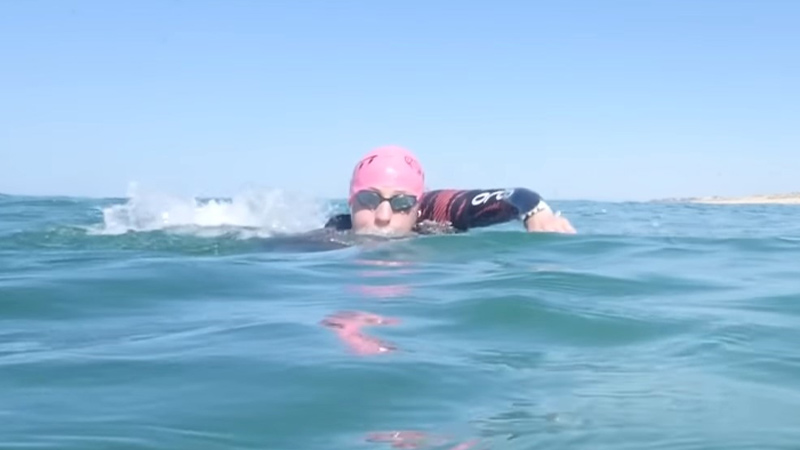
Cold water swimming can have various effects on the cardiovascular system, and these effects can influence blood pressure.
It’s important to note that individual responses can vary, and the impact of cold water swimming on blood pressure may depend on factors such as the duration of exposure, water temperature, and a person’s overall health.
Here are some ways in which cold water swimming may impact blood pressure:
Initial Increase in Blood Pressure
When you first immerse yourself in cold water, your body undergoes a cold shock response, which can lead to an initial increase in blood pressure.
This response is the body’s way of trying to adapt to sudden temperature changes and conserve heat. As blood vessels constrict, blood pressure rises.
Adaptation to Cold Exposure
Over time, with regular cold water swimming, your body may start to adapt to the cold. This adaptation can involve changes in how your body regulates blood flow and temperature.
Some studies have suggested that repeated cold water exposure can lead to increased circulation and improved blood flow, which might help regulate blood pressure more effectively.
Vasodilation After Swimming
When you exit the cold water and begin to warm up, your blood vessels typically dilate (vasodilation).
This can lead to a drop in blood pressure compared to the elevated pressure experienced during the cold water immersion.
Short-Term vs. Long-Term Effects
The initial increase in blood pressure during cold water immersion is generally a short-term and temporary response.
In contrast, the long-term effects of cold water swimming on blood pressure are less clear and may vary among individuals.
It’s essential to recognize that while there may be short-term and potential long-term cardiovascular benefits associated with cold water swimming, there are also risks involved.
The cold shock response and the risk of hypothermia can be problematic for some individuals, and they may counteract any potential benefits.
FAQs
Can cold plunge lower blood pressure?
Cold water plunges can temporarily lower blood pressure due to the body’s natural response to cold exposure, causing blood vessels to constrict and reduce blood pressure.
Is swimming in cold water bad for your heart?
Cold water swimming may pose risks for individuals with heart conditions. It can increase the heart’s workload, potentially leading to cardiovascular stress, making it unsuitable for some.
Does a cold plunge raise blood pressure?
Cold plunges initially lead to a rise in blood pressure as the body reacts to cold exposure. However, this effect is usually followed by a temporary drop in blood pressure as the body adapts.
Does cold water immersion lower blood pressure?
Cold water immersion can temporarily lower blood pressure, but the effect is generally short-lived. Prolonged exposure may lead to adaptation and less pronounced blood pressure changes.
What is cold plunge blood pressure?
“Cold plunge blood pressure” refers to the blood pressure changes experienced during and after cold water immersion.
It can vary from person to person and depends on factors like individual health, duration of exposure, and water temperature.
Wrapping Up
In the quest for managing high blood pressure, individuals often explore unconventional solutions, and cold water swimming is one such alternative therapy.
While some enthusiasts swear by its benefits, it’s essential to approach this activity with caution and consult with a healthcare professional, especially if you have hypertension or other cardiovascular concerns.
Cold water swimming can trigger a temporary rise in blood pressure due to the cold shock response, but over time, adaptation to cold exposure may lead to potential long-term cardiovascular benefits.
While it may have its merits, it should not replace established treatments for high blood pressure.
Instead, consider it as a complementary activity, and always prioritize the guidance of medical experts for effective blood pressure management.
Your health and safety should remain paramount in your pursuit of well-being.

